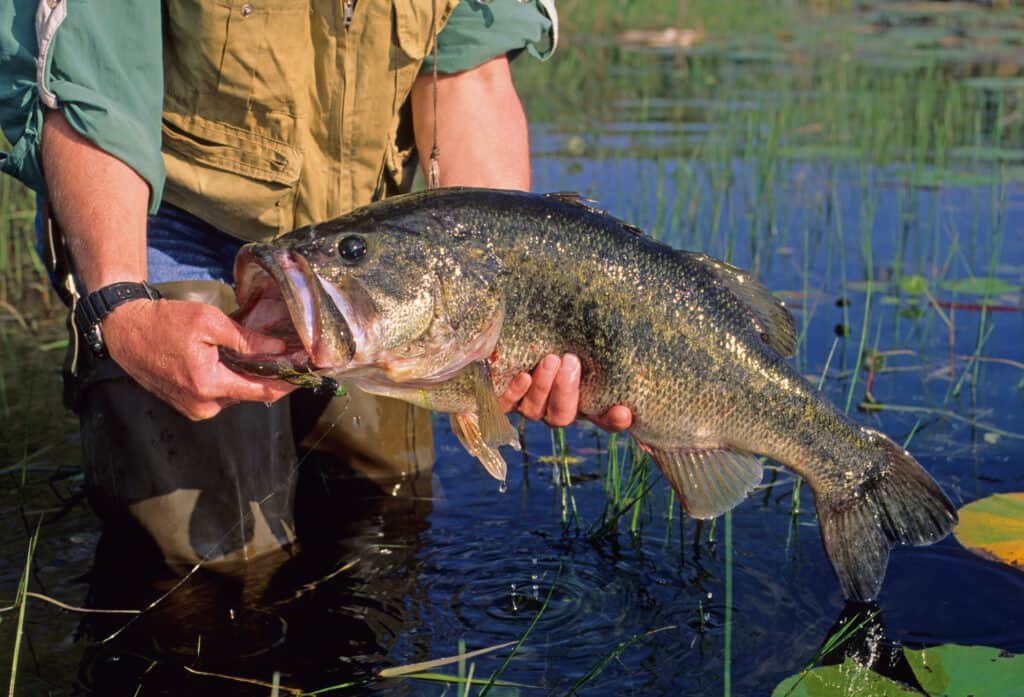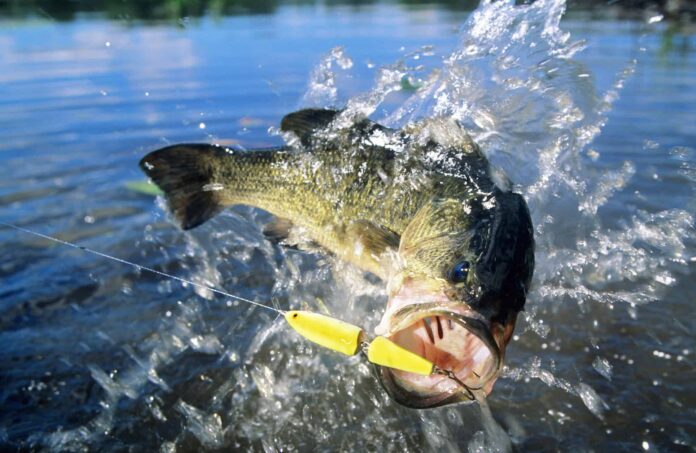The largemouth bass is, without a doubt, one of the world’s most popular, hardy, widespread, and overall impressive game fish! The Golden State proves to have a perfect climate and habitat for this unique fish, but what is the largest largemouth bass ever caught in California? How does California’s largest catch compare to the most massive specimen ever caught? Read on to learn more below!
An Introduction to the Incredible Largemouth Bass
©Ryno Botha/Shutterstock.com
The largemouth bass’ scientific name is Micropterus salmoides, making it a member of the Micropterus genus. “Micropterus” essentially translates to “small fin” or “small wing.” This refers to the species’ rather small dorsal and pectoral fins for their comparatively large body size.
Species in the Micropterus genus share several key characteristics, namely their narrow, long bodies, their small fins held up by thin, bony rods, and medium or average-sized bodies compared to other freshwater species. They’re also all native to North America and mainly live west of the Rocky Mountains. However, they’ve since been introduced to other parts of the world, like Europe’s Iberian Peninsula and even parts of eastern Asia.
The fish within the Micropterus genus are also collectively known as the black basses. 13 total species make up this group. They range in size from the redeye and smallmouth basses, which can be as small as 5 inches in length, to the largemouth bass, which can exceed 25 inches long and a hefty 20+ pounds!
Although all of the black bass species are popular as game fish, the largemouth is generally regarded as the most impressive and difficult to catch. Because of its enormous size and strength compared to other black basses and its feisty nature when caught, most anglers hold it in high regard.


A Brief History of Largemouth Bass Fishing
The largemouth bass has a long and rich history among anglers around the world. Bass fishing as a hobby has existed in North America since the mid-1800s. While all black basses are notorious for their “fight” when hooked, the largemouth has long been the most prized of all due to its more muscular build and large size.
Initially, the ideal method for catching species like the largemouth bass was fly fishing. As railway transportation became more developed throughout the United States in the late 1800s, it became easier to transport large amounts of live fish to stock them in freshwater lakes, rivers, and ponds. Because largemouth bass are so adaptable and capable of thriving in various climates, they adjusted well to being transported long distances.
Over time, this unique species established itself throughout much of North American waterways. Entire towns even established themselves around stocked “tank ponds” in the late 1800s and early 1900s. By the 1950s, the ideal technique for catching the largemouth bass shifted from fly fishing to mass-produced plastic lures. These lures, typically shaped like worms, were more effective because they closely resembled the largemouth’s main prey. A post-war fishing boom also occurred around this time, particularly surrounding bass fishing.
By the 1960s, bass fishing had fully come into its own as a North American hobby. The largemouth bass was even being gradually introduced to other parts of the world. Capture methods became perfected due to bass fishing tools and products being marketed to anglers. In 1967, the first B.A.S.S. Federation tournament was held, and the Bassmaster Classic followed in 1971.
Bass fishing remains an incredibly popular hobby–decades later, the largemouth bass is still highly regarded as the most impressive catch of all black bass species.
How Big Do Largemouth Bass Get?
The largemouth bass isn’t only notable for its large mouth! It’s also the largest of all 13 black bass species. It’s even the largest of all 38 species within the broader Centrarchidae family! Its average size tends to be around 12 to 15 inches long. It can technically grow to be as long as 3 feet, though individuals of this exceptional size are quite rare.
In addition to having a very long, large body, the largemouth bass is substantial in weight, too. Generally, individuals grow to around 10 to 12 pounds upon reaching adulthood. However, individuals upwards of 20 pounds have also been recorded!
The species is also highly sexually dimorphic, meaning female and male largemouth basses are visually distinct from one another. In particular, females are larger than the males, as their bodies must be larger, wider, and heavier overall to accommodate laying large numbers of eggs frequently. For this reason, catch-and-release fishing is ideal, since very large females breed often and contribute heavily to the survival of the species.
Due to its large and heavy body, high aggression when hooked, and impressive, almost majestic appearance, the largemouth bass is incredibly popular amongst beginner and expert anglers alike. It is highly accessible and widespread yet a challenging catch, varying widely in size.
What is the Largest Largemouth Bass Ever Caught in California?

The largest largemouth bass ever caught in California was an impressive 21 pounds and 12 ounces! This record-breaking catch occurred on March 5th, 1991. The specimen itself was caught by angler Michael Arujo, hailing from Santa Monica, California. He caught the fish at Castaic Lake in southern California.
According to an LA Times interview conducted shortly after his catch, Arujo noticed the fish near the surface of the lake, likely a breeding female getting ready to spawn. He was able to catch and reel the fish in fairly quickly, within just a few minutes after initially spotting it. Upon noticing the specimen’s substantial size, he drove back into the nearby town of Castaic and weighed the fish to certify his new record.
Amazingly, Arujo’s incredible catch also broke an 11-year state record! Prior to this, the largest largemouth bass ever caught in the Golden State was a 21-pound, 3-ounce individual caught at Lake Casitas in 1980. Angler Raymond Easley established this previous state record.
What is the Largest Largemouth Bass Ever Caught?
While Michael Arujo’s 21-pound catch is certainly impressive, it still doesn’t quite beat the world record holder. To date, the largest largemouth bass ever caught worldwide was a sizable 22 pounds and 4.97 ounces. But despite being native to North America, this particular specimen was actually caught in Lake Biwa, Japan’s largest freshwater lake. Biwa is also one of the world’s oldest lakes.
This world-record-holding catch was established by Japanese fisherman Manabu Kurita on July 2nd, 2009. Lake Biwa, north of Kyoto, is one of Japan’s most well-known fishing spots. In addition to housing an impressive number of largemouth bass, various other black basses and other popular game fish species have also established healthy populations within the area.
Today, the largemouth bass is generally viewed as an invasive species in Japan. It was first introduced to eastern Asia around 1920. The largemouth bass’ hardy, adaptable nature allowed it to thrive in the area. While it is commonly fished for sport, it isn’t often eaten or sold for food, as it is noted to have an odd texture and unusually fishy, unpalatable taste.
Incredibly, Manabu Kurita’s catch managed to break a world record that stood for 77 years. Previously, the world record was held by angler George W. Perry, who caught a largemouth bass weighing 22 pounds, 4 ounces. In 1932, he caught the fish at Georgia’s Montgomery Lake. At the time, Perry was only 19 years old! Today, a historic marker stands near Montgomery Lake to commemorate the catch, even though it’s since been just barely surpassed.
Up Next:
Credit: Source link






























